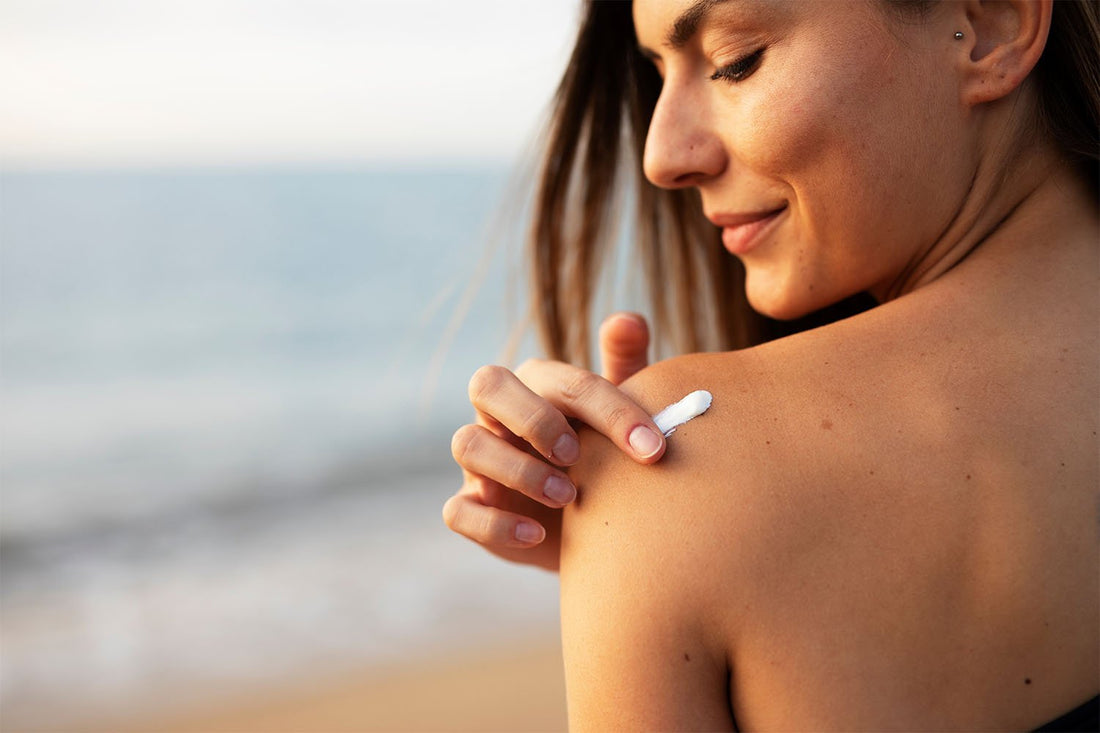
Is Suntan Lotion Bad for You? Truths and Tips for a Healthy Summer
Share
As the warm rays of summer beckon us outdoors, it's crucial to prioritise our health and protect our skin from the harmful effects of the sun. Sunscreen, commonly referred to as suntan lotion, plays a pivotal role in safeguarding our skin.
Melanoma skin cancer is the 5th most common cancer in the UK, accounting for 4% of all new cancer case, recently there have been some concerns about the safety of using suntan lotion, so we take a closer look.
Dispelling the Myths
Myth: Sunscreen prevents the body from producing vitamin D.
Reality: While it's true that sunscreen reduces vitamin D synthesis to some extent, it's not a cause for concern. We can still obtain adequate vitamin D from dietary sources such as fortified foods and supplements, ensuring our body's needs are met.
Myth: Sunscreen blocks all ultraviolet (UV) rays, hindering vitamin D production entirely.
Reality: Sunscreens typically provide broad-spectrum protection, shielding us from both UVA and UVB rays. However, they still allow some UVB rays to penetrate, which facilitates vitamin D production in our skin.
Myth: Sunscreen is toxic and harmful to health.
Reality: The ingredients used in sunscreens undergo rigorous testing to ensure their safety. The benefits of sunscreen outweigh any potential risks associated with its use. It's important to select a sunscreen with ingredients that suit your skin type and preferences.
Controversies Surrounding Suntan Lotions
While the benefits of sunscreen are well-documented, concerns have been raised about certain ingredients found in these products. Here are some of the controversies associated with suntan lotions:
Chemical Sunscreen Ingredients: Some chemical sunscreen ingredients, such as oxybenzone and octinoxate, have faced scrutiny due to their potential hormone-disrupting properties. For example, 2019 research shows that some chemicals found in sunscreen don’t just sit on top of the skin and absorb the sun’s rays, but instead, actually seep into the bloodstream. And in 2021, many spray style lotions were recalled for containing benzene , a chemical known for its potential to cause cancer.
However, the FDA has approved these ingredients for use in sunscreens within specific concentrations, considering them safe for most individuals.
Skin Sensitivities and Allergic Reactions: Like any cosmetic product, suntan lotions can cause skin irritations or allergic reactions in some individuals. It is important to read the product labels and choose a sunscreen suitable for your skin type.
Environmental Impact: Certain chemical sunscreen ingredients, when washed off in oceans or other water bodies, may have negative impacts on coral reefs and aquatic ecosystems. Opting for mineral-based sunscreens or those labeled as "reef-safe" can help mitigate this concern.
The Importance of Sunscreen
Protection against harmful UV rays: Sunscreen forms a barrier on the skin, reducing the risk of sunburn, premature aging, and skin cancer caused by excessive sun exposure.
Controlled studies have shown that regular use of an SPF 15 or higher broad-spectrum sunscreen reduces your chances of developing squamous cell carcinoma by about 40 percent, melanoma by 50 percent and premature skin ageing by 24 percent
Maintaining an even skin tone: Sunscreen helps prevent the formation of dark spots and hyperpigmentation, ensuring a more even complexion.
Anti-aging benefits: Consistent sunscreen use helps combat the development of fine lines, wrinkles, and sagging skin, preserving a youthful appearance.
Tips for Safe Sunscreen Use:
To ensure the safest and most effective use of suntan lotions, consider the following guidelines:
Choose Broad-Spectrum Sunscreens: Look for sunscreens labeled as "broad-spectrum" to provide protection against both UVA and UVB rays.
Use Sunscreens with Adequate SPF: Select a sunscreen with a Sun Protection Factor (SPF) of 30 or higher to shield your skin effectively.
Apply Generously and Reapply: Apply sunscreen generously to all exposed areas of the body and reapply every two hours or more frequently if swimming or sweating.
Check Expiration Dates: Expired sunscreen may lose its effectiveness, so ensure that your product is within the recommended shelf life.
Summer Health Tips:
Stay hydrated: Drink plenty of water to stay hydrated and maintain optimal bodily functions. Remember to increase your water intake during hot weather or when engaging in physical activities.
Dress appropriately: Choose lightweight, loose-fitting clothing that covers your skin to minimise sun exposure. Don't forget to wear a wide-brimmed hat and sunglasses for added protection.
Seek shade during peak hours: Avoid direct sun exposure between 10 a.m. and 4 p.m., as the sun's rays are strongest during this period. Opt for shade or use umbrellas to create a protective barrier.
Protect your eyes: Wear sunglasses with UV protection to shield your eyes from harmful UV rays. This helps prevent cataracts, macular degeneration, and other eye conditions caused by excessive sun exposure.
Maintain a balanced diet: Consume a variety of fruits, vegetables, whole grains, and lean proteins to support overall health and provide your skin with essential nutrients. Foods rich in antioxidants, such as berries and leafy greens, can help combat free radicals caused by sun exposure.
Practice proper skincare: Besides sunscreen, establish a regular skincare routine that includes cleansing, moisturising, and exfoliating. Use products suitable for your skin type and seek professional advice if needed.
Embracing the summer season and maintaining our health go hand in hand. Sunscreen remains a vital component of sun protection, effectively shielding our skin from harmful UV rays. By debunking myths surrounding sunscreen and following helpful summer health tips, we can enjoy the sunny days while taking care of our well-being. So, grab your sunscreen, stay hydrated, and make the most of this beautiful season while prioritising your health.
To make your summer a little healthier add one of our superfood juices to your daily diet, nutritious, healthy and hydrating a great addition to any diet. To order yours visit our shop today.



